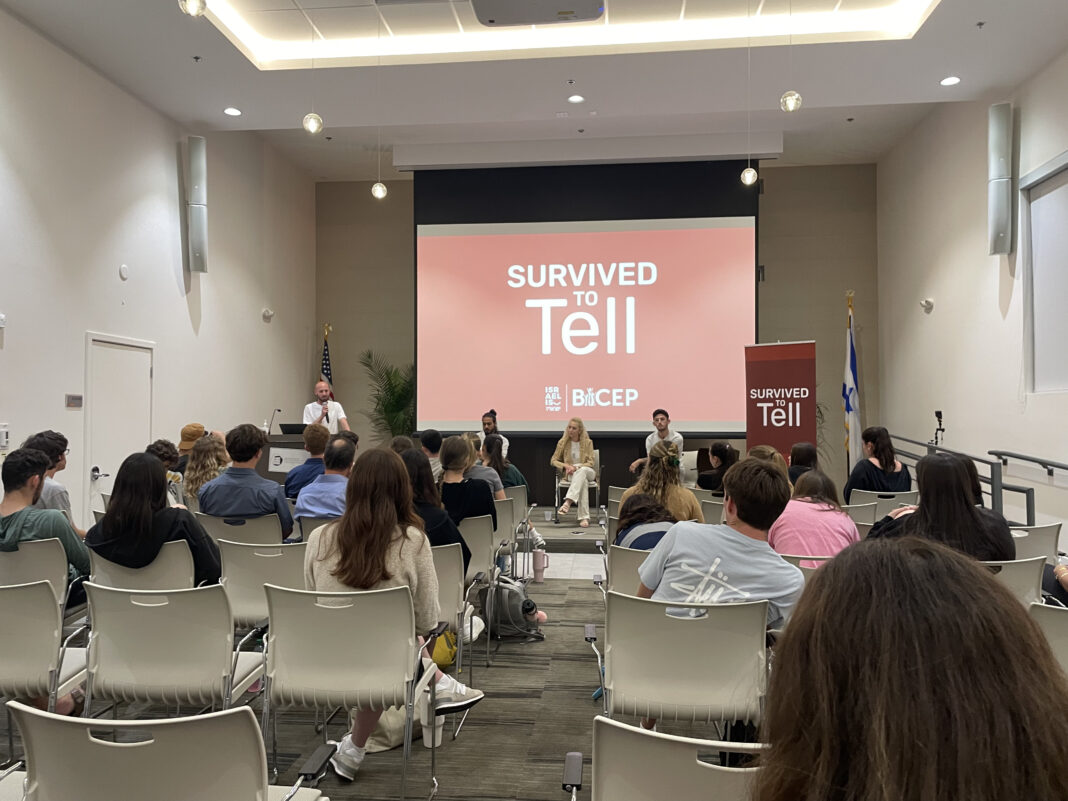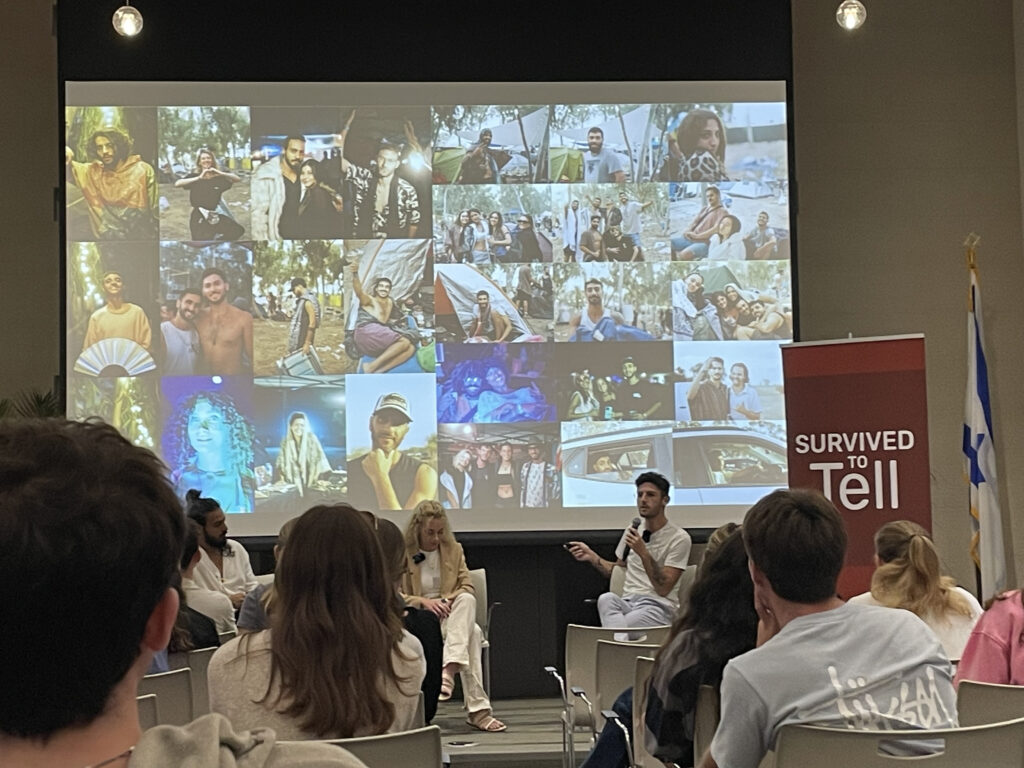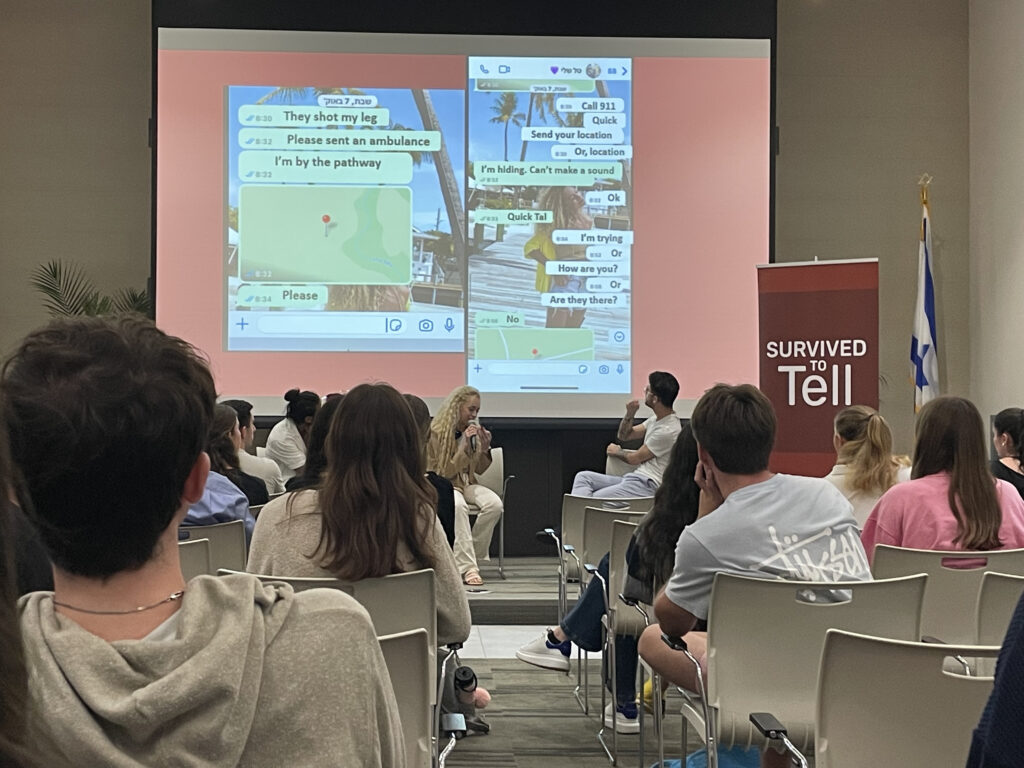
Three survivors from the Oct. 7 Hamas attack in Israel spoke about their experiences with students this past Monday at the University of Miami Hillel as part of the college tour series “Survived to Tell.”
The campaign, started and funded by Israel-is, Harvard University and Building Israel Connections Engagement Project, was created in response to a rise of antisemitism across college campuses, aiming to educate and develop empathic conversations about the ongoing war in the Middle East.
Dor Kapah, Hadar Or Elmakias and Shye Weinstein were at the Supernova Music Festival the day of the attack.
Weinstein, a Canadian who had recently moved to Israel, described having taken photos of all of the people he encountered when rockets were seen flying overhead at 6:30 a.m. that day.
“There were different responses to what was going on,” Weinstein said. “Many of the people were Israeli and grew up with this stuff, so many people were thinking ‘Oh, the rockets will stop.’ They thought about the traffic and whether or not they would leave and get ahead of it or wait it out. So I started discussing with the friends I was with if we would pack up our stuff, but the longer the rockets continued, the more nervous people became.”

Weinstein added that he heard machine gun fire on two separate occasions, leading both him and his group at the festival to run to their vehicle. He described seeing empty cars and black pillars of smoke past the festival grounds, representative of where Hamas had been burning homes in Kfar Azza, including a nearby kibbutz.
After finally getting on the main road to exit the festival, Weinstein described seeing Israeli police cars blocking the streets where they claimed Hamas militarists were hiding.
Weinstein played a video showing his view from the car as they sped past a van with Hamas soldiers aiming their weapons at his vehicle. They also needed to evade the several dead bodies that lined the street.
Elmakias,a young teacher in Tel Aviv, saw one man shot dead in front of her before being shot herself at the festival.
“I felt a sharp pain in my leg near my right knee,” she said, still needing to use a cane during her appearance on the panel. “Then all of a sudden I hear someone yelling in my direction, ‘You were shot! You were shot!’”
She described how a man nearby took off his shirt and wrapped a tourniquet around her leg to stop the bleeding. After multiple attempts to hide, she decided to run and look for help despite the injury to her leg.

Eventually, she heard a group of Israelis talking amongst themselves in Hebrew. After asking them for help, they took her to a local clinic where she waited over an hour for medical attention.
“The first thing I did when I got there was share a picture with my family and let them know I was okay,” Elmakias said. “I wrote to them, ‘Mom, Dad, I’m here, I’m alive. I love you so much.’”
Kapah was a vendor at the festival who had a tent that offered massages and physical therapy to attendees. When he heard the rockets and gunfire, he instructed his brother and girlfriend who were at the event with him to go home as soon as possible.
After driving for some time, he ran into Israeli police, who instructed him to find shelter.
“The police told us to go somewhere safe,” Kapah said. “And my response was, ‘We’re in an open field, where are we supposed to go?”
Kapah described driving as far away from the scene as possible, passing several motorcycles and vehicles with more Hamas militants in the process.
He joined the Israeli Defense Forces a month later and isolated himself completely from friends and family later in response to the trauma.
Since the attack, the Israeli government has been engaged in a war with Hamas in Gaza, with the death toll in Gaza reaching over 30,000, according to the United Nations.
There was little discussion of the war and current political situation during the panel given the sensitivity of the topic.
In an exclusive interview with The Miami Hurricane, survivors Kapah and Elmakias discussed their opinions on the growing unrest and protests in Israel as a result of the war’s delay in getting back Israeli hostages from Gaza.
“I just want peace, we just want peace,” said Elmakias. “The world stopped that day. The most important thing is to bring all of the hostages home and that’s our responsibility. There’s a lot of political divide in Israel, but I want to be with my country and my family. I want to go back to teaching, I miss my students.”






